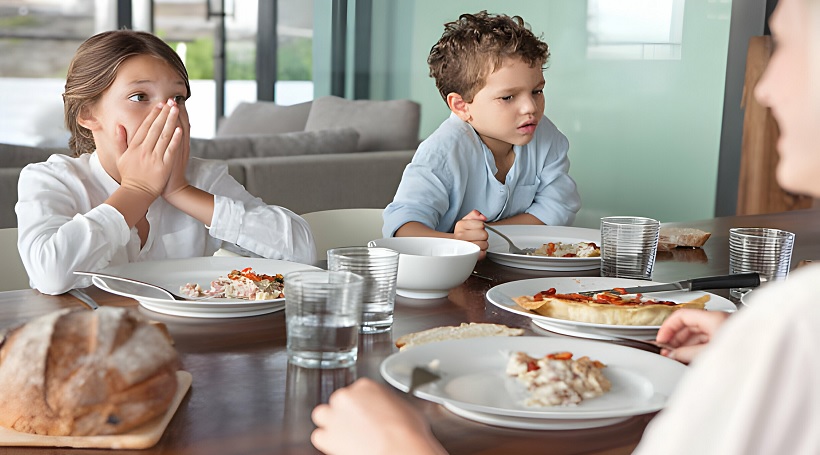Last Updated on January 1, 2025
Parenting after trauma requires seeking professional support and practicing self-care to rebuild trust and maintain stability. It’s important to create a safe and consistent environment, communicate openly, and seek therapy if necessary.
As a parent, understanding the impact of trauma on yourself and your children is crucial for navigating the challenges of parenting after trauma. We will discuss strategies for effective parenting after trauma and the importance of seeking help when needed.
By implementing these techniques and prioritizing your well-being, you can create a nurturing and supportive environment for your children while also addressing your trauma. This article aims to provide valuable insights to help you parent effectively after experiencing trauma.
Recognizing The Impact Of Trauma On Parenting

Parenting after experiencing trauma can be challenging, but recognizing its impact is essential. Understanding how trauma affects parenting and seeking support can help parents navigate the journey of healing and create a safe and nurturing environment for their children.
Read More – How To Heal From Parental Trauma?
The Connection Between Trauma And Parenting
Recognizing the impact of trauma on parenting is crucial to providing support and understanding for parents who have experienced traumatic events. Trauma can have a profound effect on an individual’s ability to parent effectively, as it can shape their beliefs, behaviors, and emotions. Understanding this connection is the first step towards offering empathy and guidance to parents on their healing journey.
Identifying The Signs Of Trauma In Parents
When parents have experienced trauma, it often manifests in their parenting style and interactions with their children. By knowing how to recognize the signs of trauma in parents, we can better understand their struggles and provide appropriate support. Some common signs include:
- Hyperreactivity or extreme vigilance
- Difficulty trusting others or forming attachments
- Difficulty regulating emotions, leading to anger or anxiety
- Re-experiencing traumatic memories or flashbacks
- Feelings of guilt, shame, or self-blame
- Isolation or withdrawal from social activities
These signs may vary in intensity and frequency, but they often impact the parent-child relationship and the overall well-being of both parties.
Ensuring Appropriate Support For Traumatized Parents
When parents have experienced trauma, it is vital to provide them with the necessary support to help them heal and develop healthy parenting strategies. This can involve various interventions and resources, such as:
| Intervention/Resource | Description |
|---|---|
| Therapy | Individual or family therapy to address trauma-related issues and develop coping mechanisms. |
| Support Groups | Connecting parents with others who have experienced trauma can provide a sense of community and validation. |
| Parenting Education | Providing parents with knowledge and skills to understand the impact of trauma on parenting and develop effective strategies. |
| Self-Care | Encouraging parents to prioritize self-care activities to enhance their well-being and resilience. |
By offering a range of supportive interventions and resources, we can empower traumatized parents to overcome their challenges and create a nurturing and secure environment for their children.
Read More – How To Confront Parents About Childhood Trauma?
Seeking Support And Healing
Parenting after trauma can be a challenging journey, but seeking support and healing is an essential step toward rebuilding a healthy and nurturing family environment.
Finding A Therapist Specializing In Trauma-informed Parenting
Finding a therapist specializing in trauma-informed parenting can provide invaluable guidance and support for parents navigating the complexities of raising children after experiencing trauma. A qualified therapist can offer personalized strategies and coping mechanisms to help parents create a secure and nurturing environment for their children.
Exploring Support Groups For Parents Who Have Experienced Trauma
Exploring support groups for parents who have experienced trauma can offer a sense of community and understanding. Sharing experiences and learning from others in similar situations can provide comfort and validation, helping parents feel less isolated and more empowered in their parenting journey.
Building Resilience And Self-care
Parenting after trauma can be an incredibly challenging experience, impacting both the parent and the child. Building resilience and prioritizing self-care is crucial for creating a safe and stable environment. By focusing on self-compassion, healthy coping mechanisms, and self-care strategies, parents can effectively navigate the journey of healing and growth with their children.
Practicing Self-compassion As A Parent
Parenting after trauma often comes with feelings of guilt and inadequacy. Practicing self-compassion is essential for parents to acknowledge their struggles and vulnerabilities. By offering themselves kindness and understanding, they can foster a nurturing and supportive environment for their children. Self-compassion enables parents to model healthy emotional responses, promoting a sense of security and acceptance within the family dynamic.
Developing Healthy Coping Mechanisms
Developing healthy coping mechanisms is vital for parents to manage the stress and emotional toll of trauma. By engaging in activities such as exercise, meditation, or journaling, parents can effectively process their emotions and maintain a sense of balance. Modeling these healthy coping strategies also sets a positive example for children, equipping them with valuable tools to navigate their challenges in the future.
Implementing Self-care Strategies
Implementing self-care strategies is crucial for parents to replenish their physical, emotional, and mental well-being. This can include setting boundaries, seeking support from friends or professionals, and prioritizing personal interests and hobbies. By prioritizing self-care, parents can recharge and replenish their energy, ultimately being better equipped to support their children through the healing process.
Read More – How Can Parents Improve Their Parenting Skills?
Nurturing Attachment And Connection
Parenting after trauma can be a challenging journey, but nurturing attachment and connection with your child can help promote healing and provide a solid foundation for their emotional well-being. Understanding the importance of attachment, building secure attachment, and repairing any difficulties resulting from trauma are vital aspects of parenting in this context.
The Importance Of Attachment
Attachment is the deep emotional bond that develops between a child and their primary caregiver. It lays the foundation for emotional and social development, impacting their future relationships and overall mental health. Children who experience trauma may struggle with attachment due to disrupted trust and feelings of insecurity. However, as a parent, you can help restore and strengthen this crucial bond.
Building Secure Attachment With Your Child
Building secure attachment with your child involves several key strategies:
- Create a safe and nurturing environment: Ensure your child feels safe and protected at home. Provide consistent routines, clear boundaries, and a calm atmosphere that promotes emotional security.
- Offer unconditional love and acceptance: Show your child that you love them unconditionally, regardless of their past experiences or behavior. Offer reassurance and support, and always make them feel valued and worthy.
- Practice responsive parenting: Be attentive to your child’s needs and respond promptly and appropriately. Engage in responsive interactions that promote trust and emotional connection.
Repairing Attachment Difficulties Resulting From Trauma
If your child is experiencing attachment difficulties resulting from trauma, it is essential to address and repair these issues. Seek professional support, such as therapy, to help navigate this complex process. Here are some strategies that can assist in repairing attachments:
- Provide consistency and predictability: Establish consistent routines, rules, and expectations to create a stable and predictable environment for your child.
- Encourage open communication: Create a safe space for your child to express their emotions and experiences. Encourage open and honest communication, and actively listen without judgment or interruption.
- Practice positive discipline: Use gentle discipline strategies that focus on teaching and guiding your child rather than punishment. Help them understand the consequences of their actions while offering guidance and support.
By understanding the importance of attachment, building secure attachment, and repairing any difficulties resulting from trauma, you can effectively nurture attachment and connection with your child after experiencing trauma. These strategies will support your child’s emotional well-being and foster a strong parent-child bond.
Creating A Safe And Stable Environment
Parenting after trauma can be challenging, but one of the most important things you can do for your child is to create a safe and stable environment. This will help them feel secure, build trust, and thrive as they navigate the effects of trauma. Here are three key aspects to consider when establishing this environment:
Establishing Routines And Consistency
By establishing routines and sticking to them consistently, you provide a sense of predictability and structure that can be incredibly comforting for children affected by trauma. Daily routines for waking up, meals, homework, and bedtime create a rhythm that provides a sense of stability. Consider creating a visual schedule or using alarms to help your child stay on track.
Creating A Trauma-informed Home Environment
A trauma-informed home environment means being aware of your child’s triggers and providing adaptations that support their healing. Ensure your home is a safe space by eliminating potential triggers or stressors, such as loud noises or clutter. Designate a calm and quiet area in the house where your child can go to find comfort and solitude when needed.
Providing Emotional Safety For Your Child
In addition to physical safety, emotional safety is crucial for children who have experienced trauma. Create an atmosphere where open communication is encouraged, and emotions are validated. Let your child know that it is okay to express their feelings and thoughts without judgment. Offer reassurance and listen attentively, providing unconditional love and support.
By focusing on these three aspects—establishing routines and consistency, creating a trauma-informed home environment, and providing emotional safety—you can create a safe and stable environment for your child. Remember that healing from trauma takes time, patience, and understanding. Your presence and commitment as a parent will make a significant difference in your child’s journey toward healing and growth.

Frequently Asked Questions On How To Parent After Trauma?
What Are The Common Challenges Of Parenting After Trauma?
Parenting after trauma can present challenges such as anxiety, triggers, boundaries, and self-care needs.
How Can Trauma Affect Parenting Styles And Approaches?
Trauma can impact parenting styles, leading to overprotectiveness, hypervigilance, or difficulty with emotional regulation and communication.
Engaging in therapy, seeking support networks, practicing self-compassion, and implementing consistent routines can assist parents in navigating the impact of trauma.
How Can Parents Effectively Communicate Their Trauma To Their Children?
Open and age-appropriate communication, validation of emotions, and prioritizing safety and trust can assist parents in effectively communicating their trauma to their children.
What Resources Are Available To Parents To Support Them In Parenting After Trauma?
Various resources such as therapy, support groups, online communities, and books specifically tailored to parenting after trauma are available to support parents in their journey.
Conclusion
Parenting after trauma can be overwhelming, but by prioritizing self-care, seeking support, and staying present, you can navigate the challenges. Remember, self-compassion is key in this journey. Be patient with yourself and your children as you heal and rebuild. By creating a safe and nurturing environment, you can help your children develop resilience and thrive.
Embrace the journey and remember that you are not alone.

